Prime Minister of the Kingdom of Cambodia Hun Sen paid an official visit to China from Thursday to Saturday. During the visit, Chinese President Xi Jinping met the prime minister and exchanged in-depth views on building a China-Cambodia community with a shared future in the new era and international and regional issues of common concern, pointing out the direction for future development.
Experts say that China and Cambodia will continue to deepen cooperation on the basis of mutual support and trust. Additionally, seeking economic recovery after the pandemic is the common aspiration of China and ASEAN countries, and the advancing cooperation between the two sides is proof that the development "pie" is getting bigger and bigger.
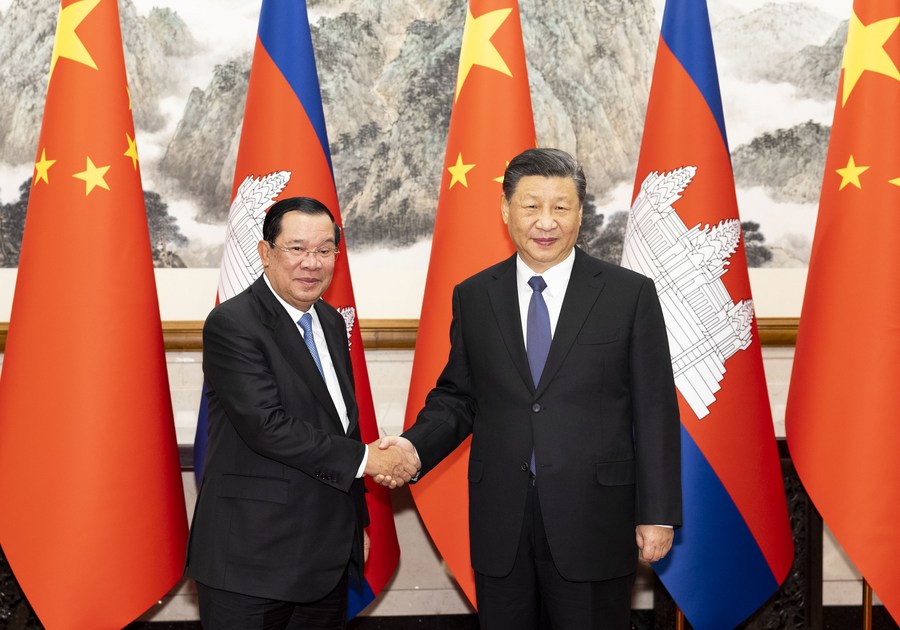
Chinese President Xi Jinping meets with Prime Minister of the Kingdom of Cambodia Hun Sen at the Diaoyutai State Guesthouse in Beijing, capital of China, Feb 10, 2023. (Photo: Xinhua)
A new era of building a China-Cambodia community with a shared future
Three years ago, Hun Sen stood firm with the Chinese people in their fight against COVID-19 and visited China as a token of support.
Recalling that meeting, Xi on Friday told Hun Sen, "It gives me great pleasure to work with you to realize our three-year appointment and open a new era of building a China-Cambodia community with a shared future at the start of spring.”
Making Cambodia a priority in its neighborhood diplomacy, China has been planning and advancing China-Cambodia cooperation in various fields from a comprehensive and strategic perspective, Xi said.
Hun Sen said that he wanted to send a clear message through his visit three years ago and the current visit that the Cambodian people will always stand firm with the Chinese people.
He added that Cambodia hopes to take the opportunity of the 65th anniversary of the establishment of diplomatic ties with China to consolidate the iron-clad friendship between the two countries.
"The Cambodian prime minister's official visit to China is a good sign of the traditional friendly relations between the two countries and the heart-to-heart bond between the two peoples," Chea Munyrith, president of the Cambodian Chinese Evolution Researcher Association, told the People's Daily.
"Hun Sen's two visits to China expresses his consistent support for China's fight against the pandemic," Gu Jiayun, director of the Center for Cambodian Studies at Beijing Foreign Studies University, told the People's Daily.
"With the recent adjustment of China's pandemic prevention and control policy, China-Cambodia cooperation in people-to-people and cultural exchanges are expected to resume quickly," Gu said.
Comprehensive cooperation framework
As for future cooperation between China and Cambodia, the Chinese president noted that the two sides could build a cooperation framework in politics, production capacity, agriculture, energy, security and cultural and people-to-people exchanges.
Hun Sen expressed his full agreement with the idea.
Xi also mentioned the establishment of an industrial development corridor and a "fish and rice corridor," hydro and solar power investment in Cambodia and joint efforts to combat trans-border crime. China will encourage more Chinese firms to invest in Cambodia and facilitate the Sihanoukville Special Economic Zone, and also prioritize the resumption and increase of direct flights to the Southeast Asian country.
"The proposed cooperation framework is a profound interpretation of the building of a China-Cambodia community with a shared future and reflects the all-round nature of China-Cambodia relations," said Gu.
"The visit creates great opportunities for the Cambodian people, and many projects are expected to land in Cambodia. China has the experience and ability to support cooperation projects with Cambodia," said Munyrith.
In April 2019, China and Cambodia signed an action plan for building a China-Cambodia community with a shared future. Since then, the cooperation between the two countries has made continuous progress.
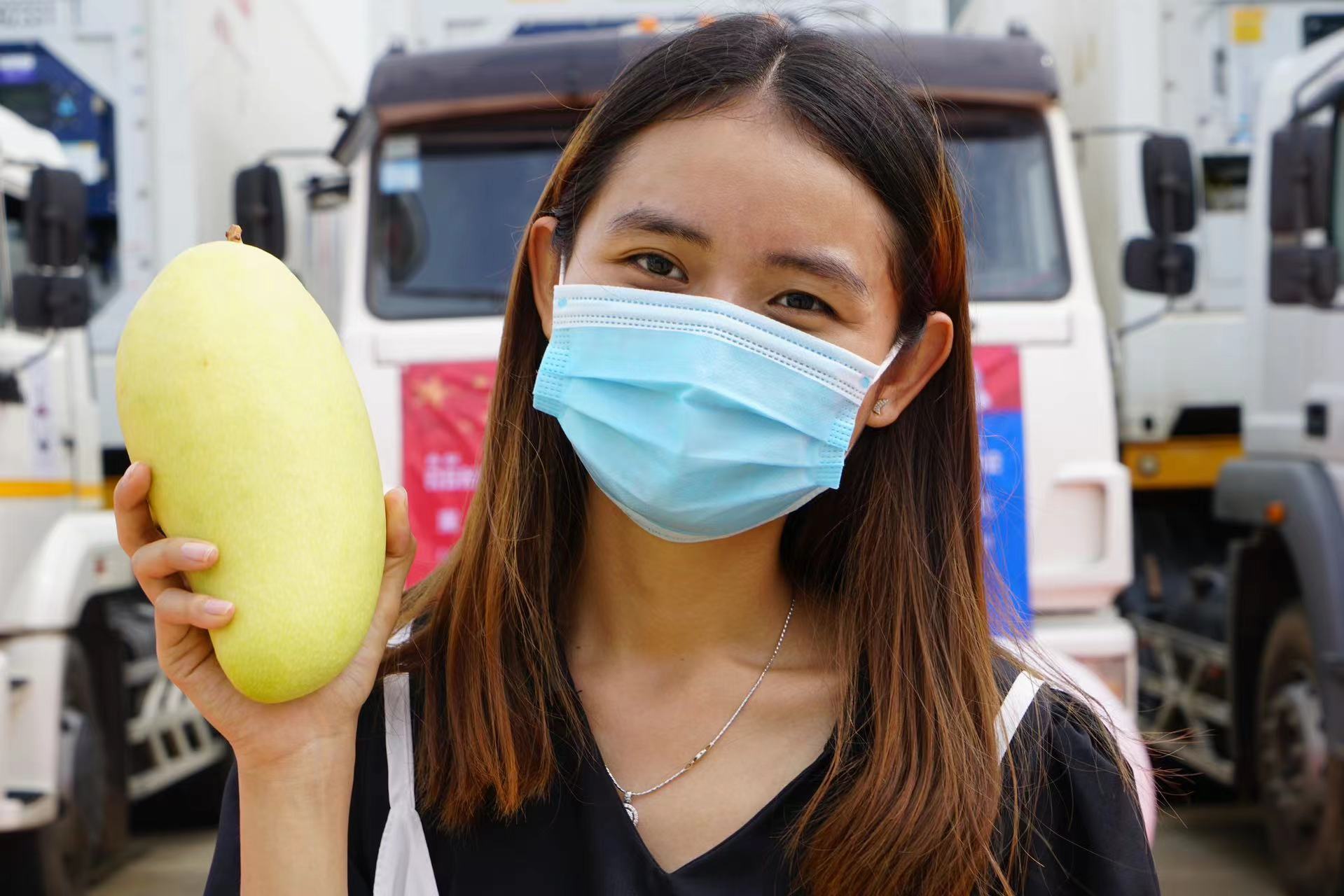
A Cambodian girl holds a mango in a ceremony held in Phnom Penh, Cambodia, marking the first shipment of Cambodian fresh mangoes to China, on May 7, 2021. (Photo by Zhao Yipu)
For instance, driven by the Regional Comprehensive Economic Partnership (RCEP) trade pact and the China-Cambodia Free Trade Agreement (CCFTA), agricultural products such as longan fruit, corn and basa fish have entered the shopping carts of Chinese people. Data shows that bilateral trade volume between China and Cambodia exceeded $16 billion in 2022, an annual increase of 17.5 percent.
Entering into force on January 1, 2022, the CCFTA is the first bilateral free trade agreement in Cambodia's history.
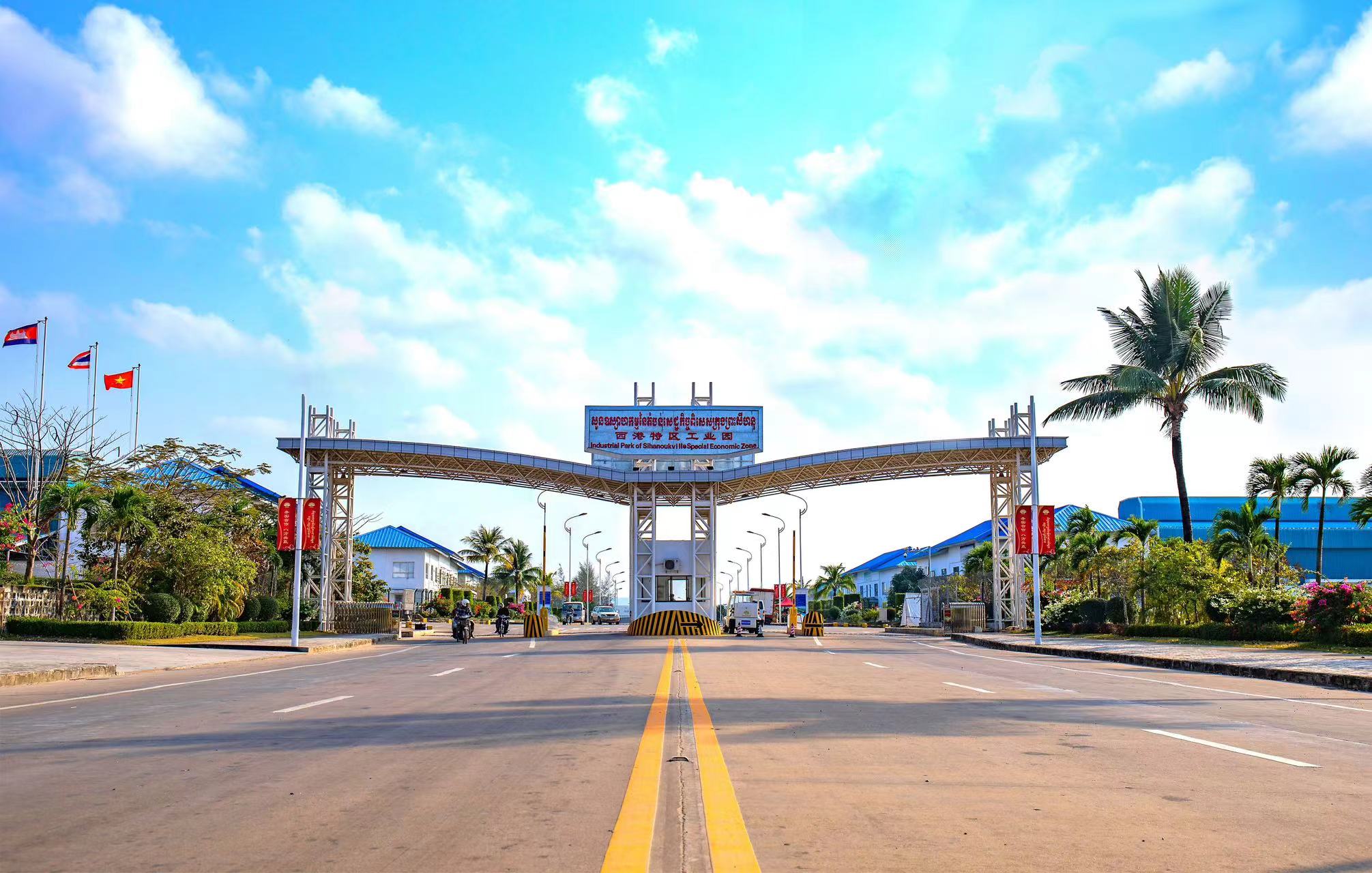
The Sihanoukville Special Economic Zone in Preah Sihanouk province, Cambodia. (Photo by Zhao Yipu)
The Sihanoukville Special Economic Zone, a landmark project of China-Cambodia Belt and Road cooperation, had a total import and export volume of nearly $2.5 billion in 2022, a year-on-year increase of 12 percent. 175 enterprises have settled in the park, creating about 30,000 local jobs.
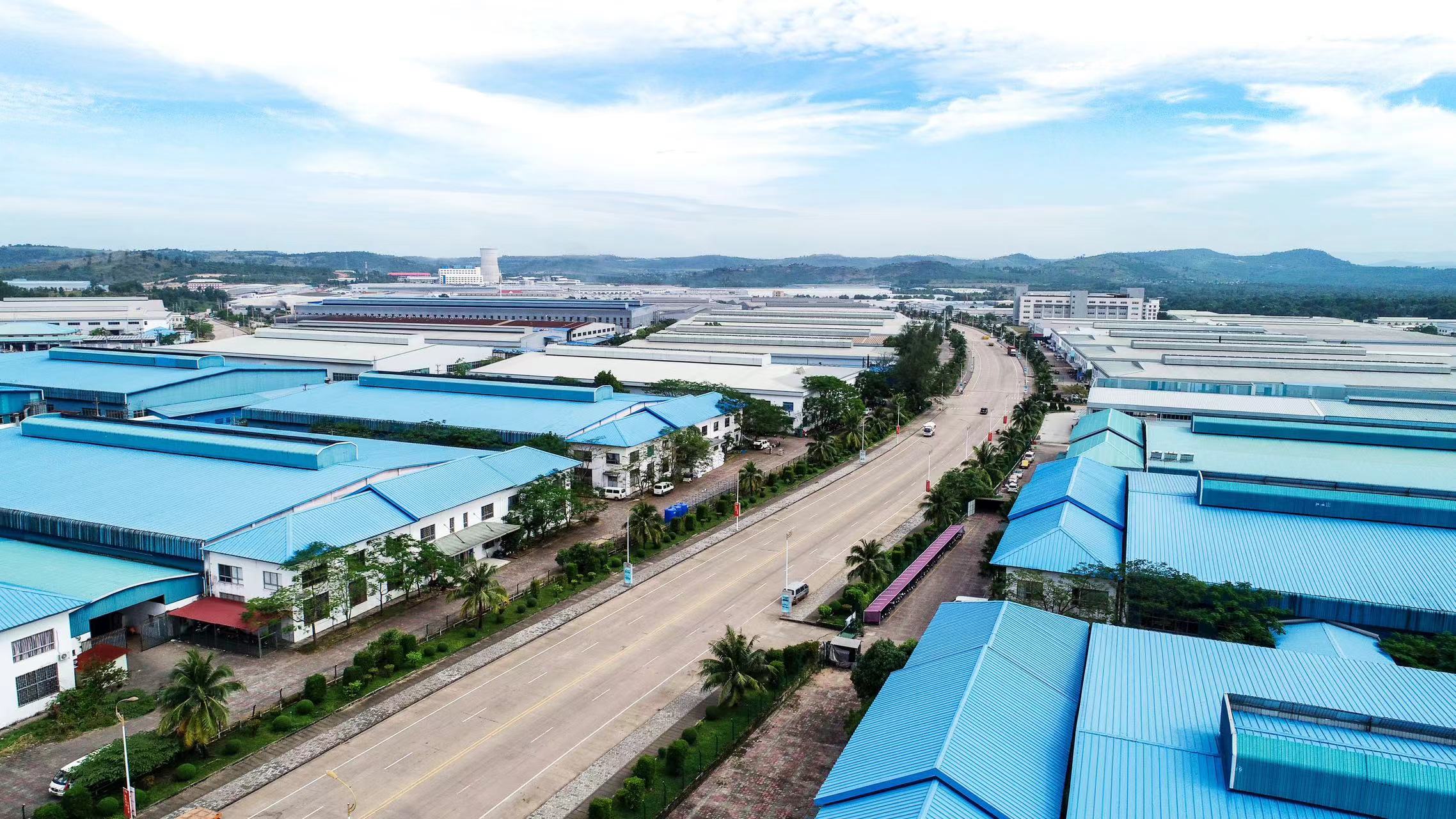
The Sihanoukville Special Economic Zone in Preah Sihanouk province, Cambodia. (Photo by Zhao Yipu)
There's a proverb in Cambodia that says: "Where there is a road, there is hope."
More than 1 million vehicles traveled on Cambodia's first-ever expressway -- connecting the capital Phnom Penh and the deep-sea port province of Preah Sihanouk -- in the three months following its inauguration on October 1, 2022.
The 187-kilometer-long freeway, in which the China Road and Bridge Corporation (CRBC) invested $2 billion, shortens the drive from Phnom Penh to Sihanoukville from five hours to less than two hours.
"We are very pleased to see that the road construction has enabled local people to enjoy convenient and comfortable transportation and improved their living standards," Zhou Yong, assistant general manager of the CRBC and general manager of the company's Cambodia office, told the People's Daily.
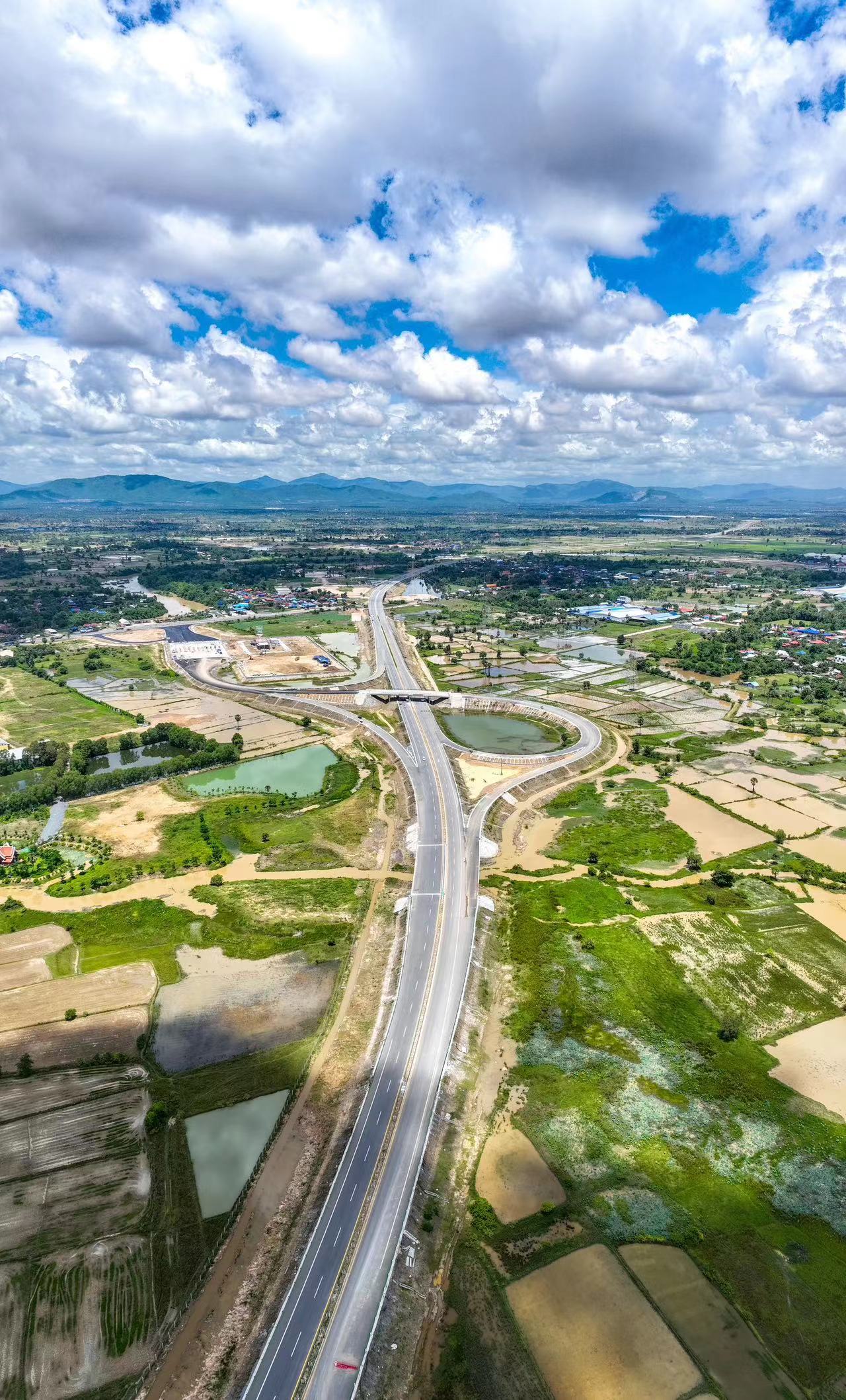
The Phnom Penh-Sihanoukville Expressway project in Preah Sihanouk province, Cambodia. (Photo by Zhao Yipu)
"Due to the traditional friendship and economic complementarity between Cambodia and China, the economic and trade exchanges between the two countries have always been very close," Neak Chandarith, director of the Cambodia 21st Century Maritime Silk Road Research Center, told the People's Daily. "As RCEP and the CCFTA gradually play a role, and Belt and Road cooperation is further promoted, Cambodia-China trade and investment cooperation will continue to reach new levels."
'Development is not the privilege of only a few countries'
Xi stressed that development is not the privilege of only a few countries.
Listing acts such as sowing ideological confrontation and the politicization and weaponization of exchanges, the Chinese president emphasized that the efforts of a power hegemony to contain and suppress other countries' development or ask regional nations to take sides will not be supported by the people.
China stands on the right side of history and will firmly safeguard national sovereignty, security, and development interests as well as international fairness and justice, Xi stressed.
Hun Sen said Cambodia is willing to continue actively promoting the development of ASEAN-China relations. He said that the Belt and Road Initiative, the Global Development Initiative and the Global Security Initiative put forward by China are of great significance to safeguarding world peace and promoting common development. Cambodia actively supports and participates in these initiatives.
Gu also noted that seeking economic recovery after the pandemic is the common aspiration of China and ASEAN countries.
Gu said that the US and some Western countries have increased pressure on ASEAN countries, including Cambodia, to "choose sides" by wooing, sanctioning and using "long-arm jurisdiction." This approach has seriously torn apart unity within ASEAN and often puts ASEAN countries in a dilemma. "However, there are no conditions attached to China-Cambodia cooperation, which is to seek common development and mutual benefit."
Cambodian children take part in the groundbreaking ceremony for the Phnom Penh-Sihanoukville Expressway project held in Kampong Speu, Cambodia, on on March 22, 2019. (Photo by Zhao Yipu)
"The dividends of Belt and Road cooperation and the RCEP trade pact are emerging," said Munyrith.
"The building of bridges, roads, and expressways in Cambodia, the opening of the China-Laos Railway and Jakarta-Bandung High Speed Railway, opening the Chinese market to fresh Philippine durian -- Cooperation between China and ASEAN countries is proof that the development 'pie' between China and ASEAN is getting bigger and bigger, and both sides are benefiting from it," he said.


